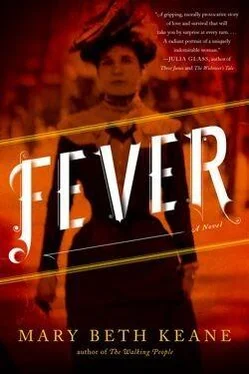“But there are places,” she said to the man cooly. “There are places. You can’t expect me to believe there aren’t.”
“There are places,” the man said. “But you have to have money. And you have to have the stomach.”
“I have the stomach.”
The doctor on East Ninetieth Street had disappeared as suddenly and completely as Dr. Tropp, but they got the name of another doctor down on Spring Street. Alfred wanted to know the extent of every penny Mary had. She could tell by the way he was standing that he expected her to go wild, tell him it was none of his business. Instead, she went to the closet and together they counted everything. The pain in his stomach was too strong for him to make it downtown himself, so she put a little powder on her face and went on her own. She expected dark alleyways, locked doors, but instead she was shown a pleasant waiting room decorated with hanging plants and an oriental carpet, and after a while she was brought into a second bright, clean room, where a bearded man asked what exactly she needed. She told him what Alfred had been taking, he told her the price, and she counted out the money and slid it across the desk.
At home, her oven was always hot, and she bought more pans so that she could have things waiting while other things were cooking. She made pies, both savory and sweet. She made roasts, stews, casseroles. Word spread. She made more money, and once every two weeks — leaving out the price of their rent — she took everything she earned and went down to Spring Street to get more drugs for Alfred. When Alfred felt up to it, he sat at the table, out of her way, and watched her with the flat of his hand against the scars on his chest.
• • •
If anyone had gotten sick from what she cooked, she never heard about it, but she found herself asking, sometimes, when someone turned up whom she hadn’t seen in a while. “I hope you haven’t been feeling poorly,” she’d say, but it was always something else that had kept them away, never her food, and she thought back on North Brother, and how silly it all seemed now. People got sick, and usually got better. When they didn’t get better, it was sad, but how could they have blamed her, one woman, when the whole of New York City was teeming with disease, and doctors now said that even the hang straps on the IRT were under suspicion? Would they shut down the subways? Of course not.
A Mrs. Hughes stopped by one morning. She lived two blocks north and her son had just gotten engaged to be married. She’d heard about Mary and wanted something special to serve to her future daughter-in-law, something she could pass off as having made herself. “A custard, like they make in the old country,” the woman suggested. “I could serve it warm over sliced fruit. I’ll bring you my dishes and you could arrange it all in them and I’ll have it all home in a wink.”
Mary stopped trimming the roast she was working on and felt her stomach drop.
“I’ll make the custard,” she said. “You have the fruit ready at your place.”
“Well, if I’m paying you…”
“No,” Mary said. “Only the custard.” She had never refused anyone and it surprised her now to be refusing Mrs. Hughes.
“But why?” the woman sputtered.
“You want the custard or not?”
“No, not unless you do the fruit, too.”
“No,” Mary said, and crossed her arms. It wasn’t because what they’d told her on North Brother was true, it was just because they’d spooked her so much that her thoughts had gotten jumbled. That was all. It was criminal, what they did to her, and who could blame her if some of it had rattled her. She wanted to wash her hands and splash water on her face.
Mrs. Hughes put her hands on her hips. “I don’t understand. I was told you do all sorts of cooking. That you’re very good.”
“Look, why don’t I do a lovely baked fruit pie. That would be nicer anyway, this time of year. You bring me your pie plate and I’ll do it lovely for you and walk it over there warm before they get there.”
“But don’t you have to slice fruit anyway for a pie?”
“Yes, but—” Mary sighed. “Fine. Bring me the fruit.”
And then one morning, Mrs. Waverly, from the third floor of their building, came down and asked if she could speak to Mary about something serious. Mary swallowed, tried to think back on every single thing she’d cooked in the previous month. She hadn’t worried so much when she was working at the bakery, but it was different there, the large kitchen, the line of customers out the door, Evelyn quietly kneading and slicing in her corner. They’d cleaned everything at night, and the equipment was always pristine when they unlocked the back door in the morning. There was ventilation at the bakery, sunlight, room to move, racks laid out specially for things to cool. Now that she was working out of her own kitchen, everything seemed cramped and every surface she touched felt sticky no matter how often she plunged a rag into hot water and wiped down the counters, the table, the cabinets, the floor. She braced herself for whatever Mrs. Waverly had come to tell her. But instead of talking about an outbreak of fever in the neighborhood, Mrs. Waverly asked Mary if she ever considered cooking in a more professional capacity.
“If you can turn meals out of this”—she took in the tiny kitchen, the small stove—“I can’t imagine what you could do in a real kitchen.” Mary kept her mouth shut and listened. “I’m head nurse at the Sloane Maternity Hospital and the cook there just quit. The wages are excellent and I can tell you that it’s a nice place to work. Have you ever cooked on that scale? The beds are usually full, plus the doctors and nurses. Guests sometimes. I can put your name in.” The woman laughed. “I’m in charge of finding the person so the deck would be stacked.”
Mary swallowed.
“It sounds overwhelming, I know,” Mrs. Waverly said, “but you’d have plenty of help.”
“It’s not that—” Mary said, placing her spoon on the counter and crossing her arms. She felt dizzy. She wanted to sit down except that she had shepherd’s pies cooling on the seats of both chairs.
“Think about it,” Mrs. Waverly said. “If you do a good job they’ll raise you. It’s steady work. The last cook was there for years.”
Mary touched the edge of the counter. She imagined the size of the refrigerator they’d have in a hospital. The size of the oven, the compartments for roasting, for warming, the stacks and stacks of clean white plates, the copper-bottomed pots.
“Look, why don’t you go down and talk to the administrator. You can ask any questions. Spell your full name for me and I’ll let him know to expect you.”
“Yes, that would be fine. Okay.”
“Do you have paper? Mary what?”
“Oh, it’s easy enough. Mary Brown. Like the color.”
• • •
The interview would have made Mary laugh if she hadn’t been so nervous. She washed the night before and again that morning, and cut her nails, and scrubbed her cuffs with baking soda and a toothbrush, and used some of Alfred’s hair tonic to smooth every strand of hair away from her face. The administrator was no cook, Mary could tell right away, and asked only whether she could turn out on that scale, not a single question on how she’d stretch ingredients, keep things simple, how she’d make it so everything would be served hot and at once. He asked for a reference, and Mary swallowed, wanted to kick herself for not expecting it. “Yes,” she said coolly. “There was Mrs. Emilia Borriello. I can write down her address. Also Mrs. Harriet… Mrs. Harriet Sloane.”
“Sloane like our Sloane? Same name?”
“Same name,” Mary said, realizing, and her heart sunk.
Читать дальше












